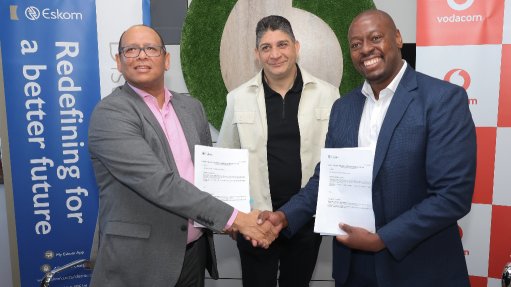
Eskom interim CEO Cassim Calib, Vodacom Group CEO Shameel Joosub and Vodacom South Africa CEO Sitho Mdlalose
Telecommunications giant Vodacom and South African State-owned power utility Eskom on Wednesday signed a first-of-its-kind virtual wheeling agreement that moves the JSE-listed firm closer to its goal of sourcing 100% of its electricity demand from renewable energy sources by 2025 while adding capacity to the strained national grid.
The agreement, co-developed by the parties to help accelerate efforts to solve the country’s energy crisis, enables Vodacom to secure independent power producers (IPPs) on the same terms and conditions that underpin its agreement with Eskom.
“Our virtual wheeling solution will enable South Africa’s private sector to participate in resolving the energy crisis which continues to impact the country’s economy,” says Vodacom Group CEO Shameel Joosub.
The unique agreement followed the conclusion of a successful pilot phase and rigorous testing last year.
The newly co-developed virtual wheeling solution is now accessible to the public and private sector on a larger scale, providing a blueprint for other participants, with the potential to be fast-tracked, depending on the available licensed capacity of IPPs.
“With the agreement now signed, Vodacom will be able to add more capacity to the grid without impacting Eskom’s balance sheet, while helping to reduce its greenhouse gas emissions,” Joosub comments.
Vodacom South Africa’s unique operating situation and the complexities associated with having over 15 000 distributed low-voltage sites across South Africa linked to 168 municipalities, previously prevented the company from accessing large-scale renewable energy from IPPs.
“Traditional wheeling typically involves a one-to-one relationship between an IPP and a buyer using the national grid to convey their energy. While the concept of traditional wheeling is fairly common practice globally, it has certain limitations for companies with complex operating environments.
“Converting our existing fossil-fuel-based electricity supplies directly with on-site renewables is limited by technical constraints that are difficult to scale. We explored a traditional wheeling option, but this had numerous limitations, which we believed could be overcome by reimagining the problem and using technology to solve the issue,” he explains, highlighting that the virtual wheeling solution addresses these challenges.
Vodacom South Africa has spent more than R4-billion on backup power solutions, and R300-million in the past financial year alone, on operational costs such as diesel for generators - a significant financial burden.
Vodacom approached Eskom with the ambition to remove complexity; to use technology to solve legacy limitations; to access renewable energy with a sound business case; and to encourage private participation to help solve the energy crisis.
“Think of it like purchasing renewable energy certificates,” adds Vodacom South Africa CEO Sitho Mdlalose.
“Most importantly, it also has the added benefit of positively impacting the supply deficit currently being experienced and nurturing the growth of renewable energy production in South Africa.
He estimates that the initial phase will move about 30% of Vodacom South Africa’s power demand onto renewable sources, with Vodacom exploring and developing additional solutions to make up the difference.
“The future of virtual wheeling is looking bright, with a number of parties from across industries already showing commercial interest in the solution enabled by Vodacom subsidiary Mezzanine.”